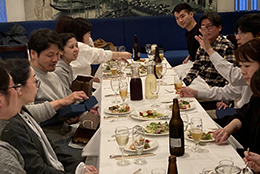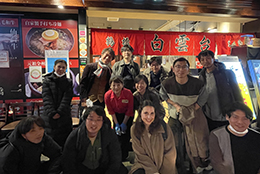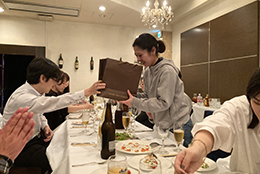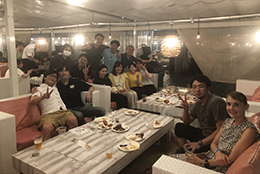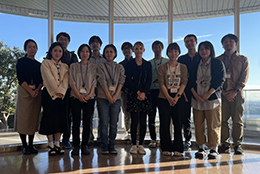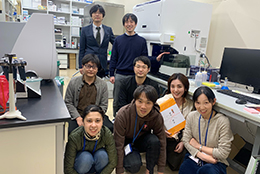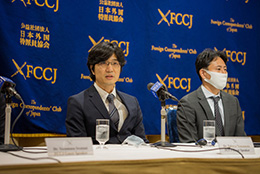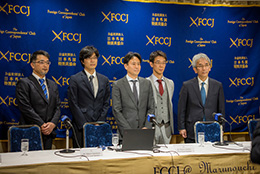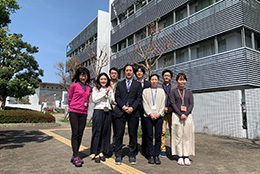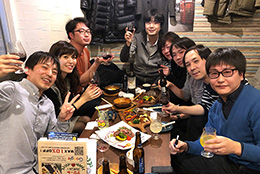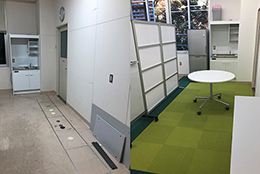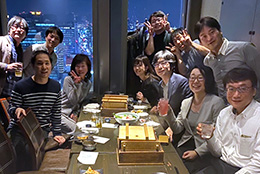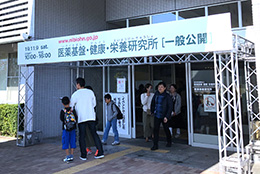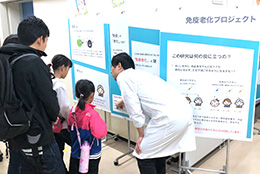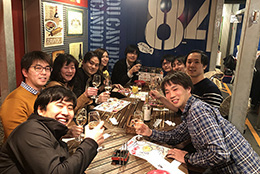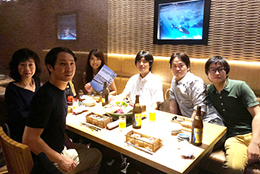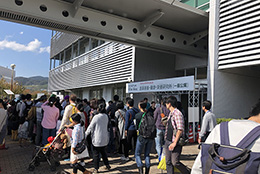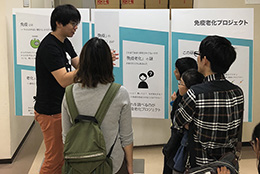The goal of Laboratory of Precision Immunology is to achieve precision medicine based on immunology and vaccine research,
and the mission is to contribute research results to the health of many people, from young to elderly.
Precision medicine refers to medical treatment that is tailored to each individual patient.
[Research Results] Press Release (in Japanese)
Clinical Trial (Phase 1) of a New Universal Influenza Vaccine Candidate Formulation Begins
[Research Results] Press Release (in Japanese)
Updated news/members etc.
WORKS

Background
Research that leads to the discovery of new immunological factors and their therapeutic applications.
Through analysis of human clinical specimens and other data, we aim to discover new immune factors against infectious diseases and cancer, leading to the development of new vaccines and therapies.
In particular, we emphasize translational research based on individual immunological differences.
For example, it has been reported that elderly people with advanced immune senescence have "a higher risk of developing concomitant cancer and infectious diseases" and that "vaccines are not sufficiently effective.
By understanding the immunological backgrounds of individuals in different age groups and for different diseases, we will identify problems and issues in current diagnosis and treatment, establish a technological platform for personalized and stratified medicine, and develop new vaccines, immunotherapy, diagnostic biomarkers, etc. by utilizing this technological platform.

Section.1
Establishment of an Advanced Immunological Analysis Platform
We believe that a more advanced analysis platform is needed to understand the characteristics of the complex human immune system and to identify problems.
Therefore, our laboratory has developed a world-class analysis platform (high-level immunological analysis platform) that enables multifaceted, high-resolution analysis of differences in the immune system and responses to immunogens in each individual.
By utilizing the above platform, we hope to extract the issues of current vaccines and therapies from the analysis of various human clinical specimens, and to validate novel therapies or diagnostic biomarkers to solve such issues at the in vivo level in non-clinical studies using rodents and non-human primates, and hopefully return them to clinical use. We would like to extract novel therapeutic or diagnostic biomarkers to solve such problems.
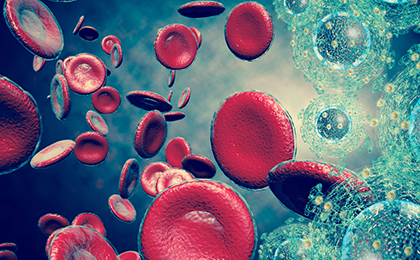
Section.2
Drug discovery research that takes into account individual differences in immunology.
We aim to establish immunological analysis systems, search for biomarkers, and establish new preventive and therapeutic methods directly related to human clinical applications by comparing human clinical specimens, genetically modified mice as animal models, and non-human primate monkey specimens on a side-by-side basis. Our major research focuses on cancer-related research and research related to infectious diseases.
The quality of SIV-specific fCD8 T cells limits SIV RNA production in Tfh cells during antiretroviral therapy.
Takahama S, Washizaki A, Okamura T, Kitamura S, Nogimori T, Satou Y, Yasutomi Y, Yoshinaga T, Yamamoto T. J Virol. 2024 (accepted)
Safety and immunogenicity of SARS-CoV-2 self-amplifying RNA vaccine expressing an anchored RBD: A randomized, observer-blind phase 1 study
Akahata W, Sekida T, Nogimori T, Ode H, Tamura T, Kono K, Kazami Y, Washizaki A, Masuta Y, Suzuki R, Matsuda K, Komori M, Morey AL, Ishimoto K, Nakata M, Hasunuma T, Fukuhara T, Iwatani Y, Yamamoto T, Smith JF, Sato N. Cell Rep Med. 2023 Aug 15;4(8):101134.doi: 10.1016/j.xcrm.2023.101134.
saRNA vaccine expressing membrane-anchored RBD elicits broad and durable immunity against SARS-CoV-2 variants of concern.
Komori M, Nogimori T, Morey AL, Sekida T, Ishimoto K, Hassett MR, Masuta Y, Ode H, Tamura T, Suzuki R, Alexander J, Kido Y, Matsuda K, Fukuhara T, Iwatani Y, Yamamoto T, Smith JF, Akahata W.Nat Commun. 2023 May 19;14(1):2810. doi: 10.1038/s41467-023-38457-x.
MESSAGE
STAFF
- Project Leader
- YAMAMOTO Takuya
- Deputy project leader
- TAKAHAMA Shokichi
- Staff Scientist
- NOGIMORI Takuto
- Senior Research Fellow
- NISHIYAMA Ayae, TOMIYAMA Takahiro, MURAKAMI Hirotomo, NAGATSUKA Yuta
- Postdoctoral Fellow
- PIBOONPRAI Kitiya
- Research Coordinator
- KATAYAMA Yuki
- Research Coordinator
(administrative work) - HIGASHI Nozomi
- Technical Staff
- IKEDA Mami, YASUMOTO Atsuko, ITO Saiko, YAGIHASHI Chie,
YOSHINOMOTO Rina, SARIYATUN Ratna, KABUTOIWA Mari, HAYASHIYAMA Mari
- Graduate student
- KUMAMOTO Mayu, FUKUSHIMA Hiroki
- Trainee
- AOMATSU Michihiro*1
- Guest Professor/Associated Professor
- TAKAHASHI Yoshimasa, YOKOTA Yasuko, YOSHIOKA Yasuo,
TANAKA Satoshi, SATO Yorifumi, AKITA Hirofumi, KIDO Yasutoshi,
FUKUHATA Takasuke, TAMURA Tomokazu
- Collaborative Researcher
- KAYO Hiroyuki, SUGAWARA Yuko, IKUO Mariko, SUZUKI Rigel,
OKINA Yoshinori
*1: Primary affiliation: Department of Gastroenterological Surgery, Graduate School of Medicine, The University of Osaka
COLLABORATOR

- USA
-
- NIH NIAID Vaccine Research Center
- Department of Microbiology, Immunology & Tropical Medicine,
The George Washington University
- France
-
- INSERM
- Centre d'Immunologie et des Maladies Infectieuses (CIMI-Paris), Sorbonne
Université, INSERM U1135 - Université de Bordeaux, CNRS UMR5164, INSERM ERL1303, ImmunoConcEpT
- Domestic
-
- Tsukuba Primate Research Center, NIBIOHN
- National Institute of Infectious Diseases
- The Research Center for Hepatitis and Immunology, The National Center for Global Health and Medicine
- The Institute of Medical Science, The University Of Tokyo
- School of Health Sciences, Tokyo University of Technology
- Department of Gastroenterological Surgery, Graduate School of Medicine, Osaka University
- The Research Institute for Microbial Diseases, Osaka University
- Department of Gastroenterological Surgery, Osaka International Cancer Institute
- Department of Gastroenterological Surgery, Osaka General Medical Center
- Department of Surgery and Science, Graduate School of Medical Sciences, Kyushu University
- Joint Research Center for Human Retrovirus Infection, Kumamoto University
- The International Research Center for Medical Sciences (IRCMS), Kumamoto University
- Hokkaido Information University
- Several pharmaceutical companies
- Nippon Becton Dickinson Company, Ltd.
- VLP Therapeutics
RECRUIT
PHOTOS
